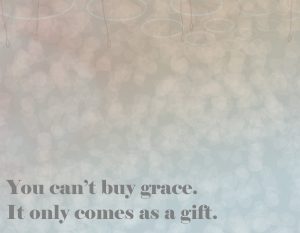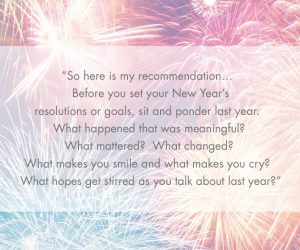Connecting Gifts: How to Use the Week between Christmas and New Year’s

I look forward to the week between Christmas and New Year’s Day. It is a peaceful contrast to the hectic days between Thanksgiving and Christmas.
Before Christmas, you have anticipation and fun activities, of course. But you also have pressure and this nagging sense that you are forgetting something. But after Christmas, there is space to remember. There is time to remember who you are and what you are called to be.
The gift-giving on Christmas morning is a reminder of the gifts of God – specifically the gift of Christ to redeem the world. “Christmas is good news!” the angels told us, “You are loved by God!” But then you clean up the wrapping paper, say goodbye to family and friends, and begin to think about resetting. You begin to think about the New Year, which is also a gift.
This week between celebrations is an opportunity. First, you celebrate God’s gift of Christ, and then a few days later you celebrate God’s gift of a new year. In this space, you can experience a unique human privilege: You get to make choices about how to connect the two gifts. How will I live out the love of God in my life?
You might say, “Don’t we have opportunity (indeed responsibility) to make these choices every day?” Of course, you are right. The way these holidays fall a week apart is a Roman invention. They set the date of Christmas and then, a couple of hundred years later, the date of the new year. So this ‘in-between week’ isn’t an institution set up from Genesis. But even if it is an accident of history, it is a gift nonetheless. And a strategic one at that.
Usually, I take a day (or half-day) for this ‘reset practice.’ I go someplace quiet and comfortable, which usually involves a glass of iced tea. I take my iPad that includes my Bible, journal, and calendar. I typically use a question similar to the one above: This year: How will I live out the love of God in my life?
Then the privilege kicks in and I begin to make choices. I make choices—not because I have to or am supposed to—but because I get to. We often don’t think of choices as a privilege; we tend to think of them as chores or obligations. But they are the core of our unique place in creation: We are given the ability to shape the direction of our life. Choice is a privilege granted by God.
So when I sit down for this reset time, I am shaping my life. Every choice makes a kind of difference, a creative response to God’s gift. Every single choice. Some choices are small. For example, I change the font I use for my journal. Sounds silly, I suppose, but I look forward to it every year. It is symbolic of new thoughts, new starts.
But I make bigger choices too, like adding or changing a spiritual habit, or starting a giving project. And I make all sorts of in-between choices: Will I continue the workout? Will I lead a life group at my church? How will I reach out to my kids? Where will my money go? And so on.
You might read this and say, “Oh, you are just making New Year’s resolutions, that’s all.” But I look at it as something more than self-improvement. I see it as a grateful and direct response to God’s gifts. I look at it as part of the cosmic dance of grace. God’s love flows toward me and I respond with gratitude and participation. I get to make choices. I get to shape my life to reflect the gift of God.
Take the time this year to participate in this great dance. Set aside the time to reflect on the demonstration of God’s love toward you in Christ. Set aside the time to receive the life granted you in the form of this new year, then connect the two gifts with your ability to choose. Shape your daily life to represent the love of God.
 Roger Edwards joined The Barnabas Center in 1991. He works with both with individuals and couples, helping people confess their need and embrace their available choices to lead healthier lives. Roger also teaches and leads discussion groups and retreats applying the Gospel to everyday life. He is a licensed professional counselor (LPC), holds a master’s degree in biblical counseling from Grace Theological Seminary in Indiana and earned a bachelor’s degree in engineering from the University of North Carolina at Charlotte. He is married to Jean and they have seven children and nine grandchildren.
Roger Edwards joined The Barnabas Center in 1991. He works with both with individuals and couples, helping people confess their need and embrace their available choices to lead healthier lives. Roger also teaches and leads discussion groups and retreats applying the Gospel to everyday life. He is a licensed professional counselor (LPC), holds a master’s degree in biblical counseling from Grace Theological Seminary in Indiana and earned a bachelor’s degree in engineering from the University of North Carolina at Charlotte. He is married to Jean and they have seven children and nine grandchildren.







